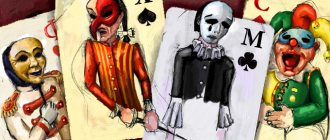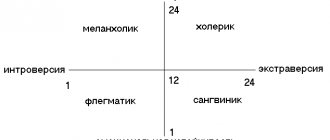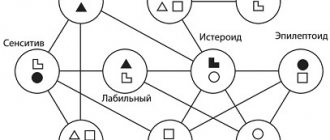Definition: What is temperament?
Temperament is a stable combination of individual psychophysiological characteristics of a person associated with dynamic rather than meaningful aspects of activity. Temperament has nothing to do with social development and the characteristics of an individual’s upbringing, but it significantly influences the development of an individual.
Simply put, this is the speed of mental processes that occur in the nervous system. It is impossible to influence temperament, but it is possible to achieve its correction in order to eliminate negative qualities.
Definition: What is temperament?
Choleric - positive and negative qualities, suitable professions and activities
This is a fairly bright psychotype, which has both negative and positive sides.
Negative aspects of choleric:
- Can't stand being defeated by others
- Impatient, always in a hurry, which is why they end up in unpleasant situations
- Emotional and truthful. People often get offended by them for this
- Hysterical. The slightest unpleasant word can cause a storm of emotions and indignation
- Superficial. They rarely delve into the essence of the problem; they are not interested in digging into something and delving into it
- They quickly get to work, but just as quickly they quit what they started without finishing it
Positive qualities of a choleric person:
- Fast and agile. Can instantly complete assigned tasks
- Decisive. They always know what to do in a specific situation without hesitation
- They are not afraid of change. Always go on adventures
- They don't hold grudges. They move away quickly and don't get angry
Recommended professions:
- Designer
- Geologist
- Artist
- Photographer
- Entrepreneur
- Advertising agent
It is better to give preference to a flexible schedule rather than hourly work. Choleric people are better off working for results rather than spending hours in the office.
Choleric - positive and negative qualities, suitable professions and activities
Choleric
They belong to an unbalanced, overly mobile type of psyche. They are aggressive, impulsive, quick-tempered, but not vindictive. They make persuasive speakers, able to organize people and help them make the right decisions. Unrestrained, sometimes rude choleric people do not show their love and tenderness to loved ones, considering these emotions useless.
Choleric people are confident that they are always right in everything, so they prefer not to listen to the advice of others. On the contrary, they strive to control loved ones, imposing on them their point of view and views on behavior. To establish a harmonious relationship with a choleric person, you must follow 7 rules of interaction:
- He speaks first and thinks later. The interlocutor should not make hasty conclusions based on what was said.
- It must be remembered that choleric people are controlled by emotions, most often negative. Therefore, in a calm state, he is able to change his opinion to the opposite.
- During a quarrel, an individual is capable of saying a lot of unpleasant things. This does not mean that he actually had such an opinion on the topic of conversation.
- You should not immediately be offended by the angry tirades of a choleric person. You should be patient and forgiving.
- They do not remember minor quarrels and are often surprised that people can be offended by them.
- It is undesirable to put pressure on an individual.
- He needs understanding and support.
It is especially difficult for the other halves of choleric people, since the type is jealous and prone to scandals. But their mood quickly changes.
Positive sides
Despite the explosive and complex temperament, choleric people can have a lot of positive qualities that help them make their way in life and achieve their goals. Main advantages of the type:
- Purposefulness and determination.
- Self-sufficiency and independence from other people's opinions.
- Activity and dynamism.
- Energy and mobility.
- Passionate and straightforward.
- Resilience and self-confidence.
- They take on new work with enthusiasm.
The type is characterized by leadership qualities, so choleric people become wonderful leaders, capable of skillfully managing their subordinates. The profession of a businessman and journalist, surgeon and manager, actor and investigator suits them. Activities related to accounting or training will quickly get boring for a choleric person, so it is better for him to avoid these areas.
READ Arrogance: how to recognize vanity and pride
Flaws
Individuals with strong temperaments are not without shortcomings. The obvious disadvantages include:
- They love to command, which is not always liked by friends or colleagues.
- They love to argue, proving that they are right.
- They hate losing. They turn themselves inside out to achieve victory, even if losing is inevitable.
- Impatient, aggressive and hot-tempered. Any trifle can make them angry.
- They are overly impulsive, so they do not know how to relax completely.
- They lack sentimentality and do not like it when other people show it.
- Unfriendly and unresponsive.
Cholerics should learn to extinguish their emotions in order to maintain a cool mind in unforeseen and difficult situations. This will save them from making decisions that they will later regret. Cholerics need to take note of the 10-second tactic. Its essence is that a person must count to 10 before saying his thoughts out loud. During this short time, the intensity of emotions subsides, and it is easier for the choleric person to cope with the surge of anger or irritation.
Sanguine person - positive and negative qualities, suitable professions and activities
This is one of the most pleasant psychotypes. Unlike choleric people, they are emotionally stable.
Negative sides:
- Superficiality
- Haste
- Reluctance to delve into the depth of the situation
- Frivolous
- They like to brag
- No sense of proportion
Positive sides:
- Leaders. They often take on the task of organizing some kind of community and succeed in this matter.
- Stress-resistant and harmonious. They try not to react painfully even to the most unpleasant situations. It's hard to piss them off.
- Rarely suffer from mental illness. Due to their stable psyche, there are no patients among them in mental hospitals.
- Optimistic. Even in the most difficult situations they try to find something positive.
Recommended professions:
- Administrator
- Teacher
- Human Resources Manager
- Economist
- Journalist
- Lawyer
Sanguine person - positive and negative qualities, suitable professions and activities
Melancholic
Pessimistic people are often called melancholic. And for good reason. It is they, according to psychologists, who are more susceptible to depression than other types. They do not need to look for reasons to be sad, since self-pity already sets a person up for a negative wave. To better understand a melancholic person, it is necessary to study the description of his temperament:
- He does not like screams or harsh sounds, so in his company it is necessary to behave with restraint.
- Criticism deeply hurts his tender nature. If it is necessary to give a negative assessment of his actions, then it is better to express censure in a mild form.
- Entertainment related to extreme sports is not for him.
- Loves intimate conversations with sincere and sad stories.
- Prone to drama.
- Prefers work that requires concentration and attention. But he hates being pushed, because he immediately gets lost and panics.
- He makes new acquaintances slowly, preferring to first take a closer look at possible friends.
- He has developed intuition, which rarely lets him down.
Due to indecision and fear of rejection, melancholic people cannot build relationships for a long time. But as partners they choose individuals who are distinguished by temperament, will and perseverance, that is, those qualities that they themselves lack.
READ Negative character traits and ways to correct them
Strengths
Using his positive qualities to the fullest, a melancholic person is able to reach the pinnacle of success in his chosen field and make discoveries. Its strengths include:
- Giftedness, a penchant for creativity. He shows himself quite well in acting and music.
- Integrity and dedication.
- Ability for philosophical reasoning.
- Sensitivity. He is especially sensitive to beauty.
- Thoughtfulness and prudence. Possesses analytical thinking and is able to think deeply.
The melancholic person is devoted to his family and friends and always tries to keep his promises. He is independent, preferring not to react to rewards and possible punishments. Looks at the world realistically and assesses his capabilities without illusions.
Flaws
The basis of the shortcomings is the tendency to low self-esteem. A melancholic person constantly looks for flaws in himself, which prevents him from enjoying life. The disadvantages of temperament include:
- Good memory for negative life events.
- Concentrates on himself and his own experiences.
- Predisposed to hypochondria and persecution mania, developing a mental dependence on negative emotions.
- He is characterized by isolation, vulnerability, and is subject to frequent mood swings.
- He likes to have his head in the clouds, so he often ignores conversations.
Melancholic children and teenagers are especially vulnerable. Parents should develop a concept for raising a child in order to raise a confident, successful person and suppress an unreasonable inferiority complex in him.
Melancholic - positive and negative qualities, suitable professions and activities
Quite a complex psychotype with unstable reactions.
Positive sides:
- Gullible
- Creative personalities
- Prone to compassion
- Friendly
- They know how to listen
- Loyal to your soulmate
- Good friends
Negative sides:
- Prone to depression
- Pessimistic
- Prone to criticism
- They don’t know how to communicate with people and don’t want to
- Avoid noisy companies
Recommended professions:
- System Administrator
- Programmer
- Librarian
- Editor
Melancholic - positive and negative qualities, suitable professions and activities
Phlegmatic - positive and negative qualities, suitable professions and activities
People with this psychotype are the golden mean between other temperaments. They are balanced, calm and positive.
Positive sides:
- Workaholics. These are the worker bees of society, the best workers
- Stress-resistant. It's very difficult to piss them off
- Patient. They endure for a long time not because it is necessary, but because everything suits them
- Purposeful. They methodically carry out their work and bring it to completion.
Negative sides:
- They don't like change. For them, moving is a natural disaster.
- It is difficult to find a common language with people. They are generally not very sociable by nature.
- Inhibited. They are often lazy and do not strive for anything. Complete lack of initiative
Recommended professions:
- Engineer
- Vet
- System Administrator
- Dispatcher
- Laboratory assistant
- Jeweler
Phlegmatic - positive and negative qualities, suitable professions and activities
Types of temperament I. P. Pavlova - classification of temperaments based on types of nervous system.
I. P. Pavlov showed that the basis of higher nervous activity is three components: strength (the individual maintains a high level of performance during long and intense work, recovers quickly, does not react to weak stimuli), balance (the individual remains calm in a stimulating environment, easily suppresses his inadequate desires) and mobility (the individual quickly reacts to changes in the situation, easily acquires new skills). I.P. Pavlov correlated the types of nervous systems he identified with psychological types of temperaments and discovered their complete similarity. Thus, temperament is a manifestation of the type of nervous system in human activity and behavior. As a result, the relationship between types of nervous system and temperaments is as follows:
1) strong, balanced, active type (“lively”, according to I. P. Pavlov - sanguine temperament;
2) strong, balanced, inert type (“calm”, according to I.P. Pavlov - phlegmatic temperament;
3) strong, unbalanced, with a predominance of excitement (“unrestrained” type, according to I.P. Pavlov - choleric temperament);
4) weak type (“weak”, according to I.P. Pavlov - melancholic temperament).
A weak type cannot in any way be considered a disabled or not entirely full-fledged type. Despite the weakness of nervous processes, a representative of a weak type, developing his own individual style, can achieve great achievements in learning, work and creative activity, especially since a weak nervous system is a highly sensitive nervous system.
Sanguine temperament. A representative of this type is a lively, inquisitive, active (but without sudden, impetuous movements) person. As a rule, he is cheerful and cheerful. Emotionally unstable, easily succumbing to feelings, but they are usually not strong or deep. He quickly forgets insults and experiences failures relatively easily. He is very team-oriented, easily establishes contacts, sociable, friendly, friendly, quickly gets along with people, and easily establishes good relationships.
Phlegmatic temperament. A representative of this type is slow, calm, unhurried. In his activities he demonstrates thoroughness, thoughtfulness, and perseverance. He is inclined towards order, familiar surroundings, and does not like changes in anything. As a rule, he brings the job he starts to completion. All mental processes in a phlegmatic person proceed slowly. This slowness can interfere with his educational activities, especially where he needs to quickly remember, quickly understand, figure out, and do quickly. In such cases, a phlegmatic person may show helplessness, but he usually remembers for a long time, thoroughly and firmly.
In relationships with people, a phlegmatic person is always even-tempered, calm, moderately sociable, and has a stable mood. The calmness of a person of phlegmatic temperament is also manifested in his attitude towards the events and phenomena of life: a phlegmatic person is not easily enraged and emotionally hurt, he avoids quarrels, he is not unbalanced by troubles and failures.
Choleric temperament. Representatives of this type are distinguished by their speed (sometimes feverish speed) of movements and actions, impetuosity, and excitability. Their mental processes proceed quickly and intensely. The imbalance characteristic of a choleric person is clearly reflected in his activities: he gets down to business with enthusiasm and even passion, takes initiative, and works enthusiastically. But his supply of nervous energy can quickly be depleted in the process of work, especially when the work is monotonous and requires perseverance and patience, and then cooling may set in, elation and inspiration disappear, and the mood drops sharply. The predominance of excitement over inhibition, characteristic of this temperament, is clearly manifested in communication with people with whom the choleric person allows harshness, hot temper, irritability, emotional restraint (which often does not give him the opportunity to objectively evaluate people’s actions) and on this basis sometimes creates conflict situations in the team .
Melancholic temperament. In representatives of this temperament, mental processes proceed slowly, people have difficulty reacting to strong stimuli; prolonged and strong stress causes them to slow down their activity, and then stop it. They get tired quickly. But in a familiar and calm environment, people with this temperament feel calm and work productively. Emotional states in people of melancholic temperament arise slowly, but are distinguished by depth, great strength and duration; melancholic people are easily vulnerable, they have a hard time withstanding insults and grief, but outwardly these experiences are expressed weakly in them.
Representatives of a melancholic temperament tend to be withdrawn, avoid communicating with unfamiliar, new people, are often embarrassed, and show great awkwardness in a new environment. Melancholic people are often distinguished by softness, tact, delicacy, sensitivity and responsiveness: those who are vulnerable themselves usually subtly feel the pain that they themselves cause to other people.
Mixed types of temperament: description, characteristics
Pure psychotypes are very rare. Usually these are various variations of two or more temperaments.
Mixed temperaments:
- Phlegmatic/sanguine. Active, but not in a hurry, have a lot of friends, like to be in company, but not attract much attention. Stress-resistant, efficient. They can speak beautifully, but also remain silent when necessary.
- Melancholic/phlegmatic. Reserved, scrupulous and pessimistic. They are often depressed, but quickly get out of it. They love to do one thing and see it through to the end.
- Sanguine/choleric/phlegmatic. Balanced and very active psychotype. They always attract attention and achieve success in business. They get along well with people, but dominate when necessary.
- Choleric/sanguine. Strong, caring, able to communicate with people. These are always leaders and individuals prone to dominance. Active and purposeful.
- Choleric / sanguine / melancholic. Active and purposeful, but at the same time ready to make concessions. They perform well in front of an audience and can lead.
- Phlegmatic/choleric . They finish what they started. They love stability and always stand their ground. They try to dominate, although they don’t always succeed.
- Sanguine/melancholic. Persuasive, critical and persistent. They are trying to turn the situation in their favor. True friends, picky, do not like to speak in public.
- Melancholic / sanguine / phlegmatic. They do everything according to the rules, are not aggressive, caring and secretive. Kind to people and sensitive. Good friends and helpers.
- Melancholic / phlegmatic / choleric. Stable, cautious and persistent. Caring and positive. Too critical and demanding.
Mixed types of temperament: description, characteristics
Which temperament type is better?
choose the sanguine person as their preferred type - they say he is cheerful, cheerful, but with the rest there is something “off”.
Mistake: each type has advantages that need to be used wisely, and disadvantages (even for the “ideal” sanguine person) that need to be corrected.
There are no bad or good temperament types . Efforts should be directed not at alteration (which is impossible due to its innate nature), but at the reasonable use of the advantages and leveling (what is this?) of the disadvantages of each type.
It is impossible to change a person’s temperament, he can be educated through training of volitional qualities, developing skills to control one’s own behavior. You just need to understand what exactly requires attention.
For example, for a choleric person this is the education of restraint, for a sanguine person - perseverance. The phlegmatic person will have to work, with his characteristic painstaking nature, to overcome lethargy and inertia, and the melancholic person will have to work on developing sociability.
What cannot be changed must be applied wisely. For example, a sanguine person is cheerful and energetic, but it is difficult to imagine him in the role of an accountant or restorer. A phlegmatic person will reach heights in these professions, but he will not make an actor or television reporter.
How to determine your temperament?
There is a certain method for determining a psychotype. At the same time, you should not expect that you will get 100% belonging to any particular type. Usually this is the percentage of different psychotypes in one person.
To determine the types of temperament, the psychological methodology of the English psychologist G. Eysenck is used, who developed a two-factor model, the main characteristics of which are extroversion and neuroticism.
How to determine your temperament?







